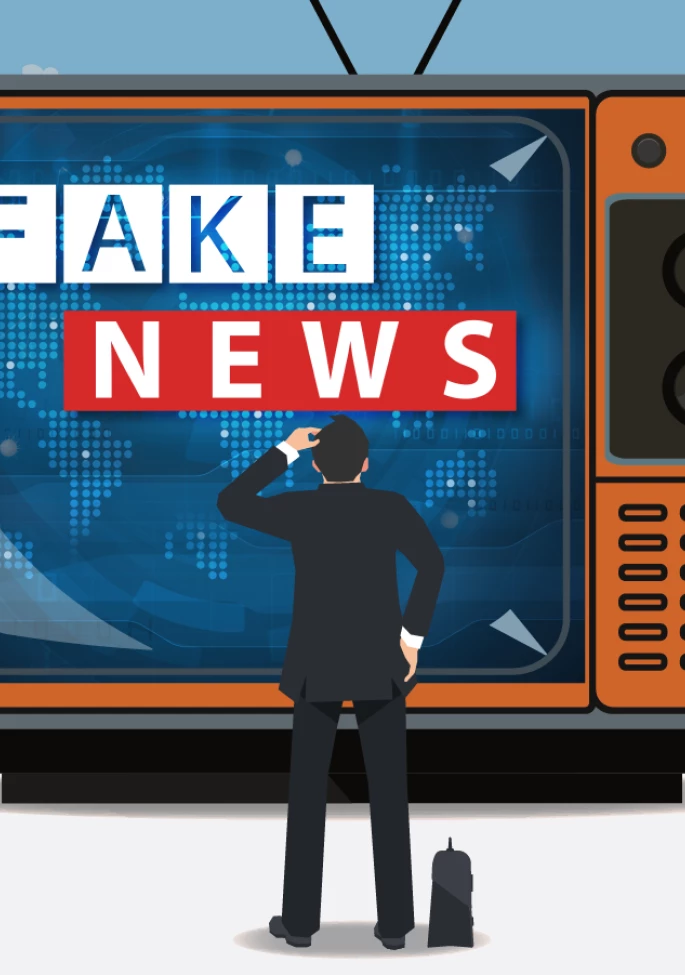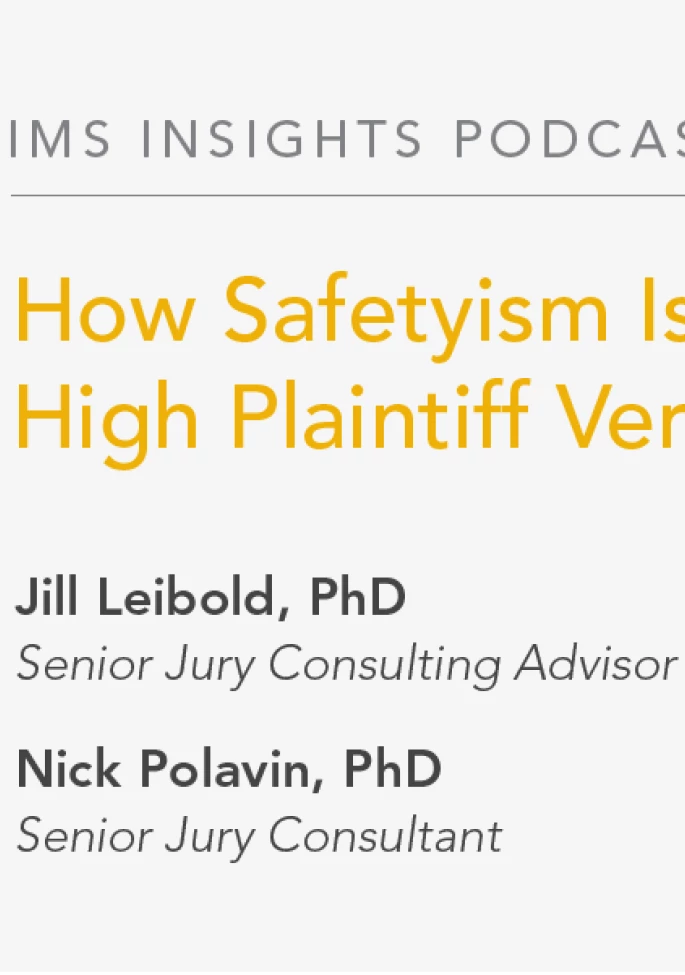Consider this recent example of two jurors, one a trial juror and one a mock juror. In both cases, the defendants’ arguments relied largely on the Environmental Protection Agency (EPA).
The trial juror: A very liberal, millennial female with blue hair and multiple facial piercings. She had made multiple donations to various health and human rights organizations and indicated a preexisting negative opinion of the defendant. She also had high education levels, and her social media suggested support for the World Health Organization (WHO) and Food and Drug Administration (FDA).
The mock juror: A Republican, baby boomer male. He was a self-employed, blue-collar worker with low education who had indicated a “favorable” opinion of the defendant. He believed there are too many lawsuits, though he also responded that he might be more likely to believe an individual’s version of events over a corporation’s. Finally, he thought COVID-19 fears had been overblown and he lacked trust in the Centers for Disease Control and Prevention (CDC).
One of these jurors ended up being the strongest defense supporter on the jury and did not want to award any damages to the plaintiffs. The other ended up being one of only two plaintiff jurors and refused to give in to the defense majority. So, which juror was which?
If you can see where this is going—yes, the liberal, millennial female was the staunch defense juror, and the conservative, baby boomer male was the plaintiff diehard. These jurors behaved in opposition to several statistical predictors: political orientation, opinion of the defendant, and certain other demographics (granted, demographics should rarely be relied upon). So, as consultants for both defendants, why had we not recommended striking the liberal trial juror, and why were we not especially surprised to see the conservative mock juror vote plaintiff? Because times are changing in ways that force us to question conventional wisdom.
Regarding political orientation, we have seen increasing anecdotal evidence that it is no longer the same predictor. It is important to note that political orientation was never a strong predictor; it depended on the case facts and the venue, and, ultimately, has always been worth confirming through jury research. But it traditionally has been a moderate predictor because, for one, people who identify as Republican tend to put a greater emphasis on “personal” responsibility—meaning, for example, they pay attention to whether the plaintiff misused a product or did not read its instructions or warnings (a “buyer beware” mindset). In contrast, people who identify as Democrat tend to emphasize what is known as “social” responsibility; that is, they look for whether society, the government, and/or a defendant have done enough to set people up for success (a “seller be fair” mindset).
What has changed in the past few years? Well, for a variety of reasons, certain conspiracy theories have been embraced by a large segment of the population, particularly among Republicans. Conspiracies are no longer limited to people who believe the moon landing was faked or that the FBI assassinated JFK. Throughout 2020 and 2021, there was a great deal of misinformation and disinformation spread regarding the COVID-19 pandemic and the 2020 presidential election. This led to a significant portion of the public buying into beliefs that lacked confirming evidence. As recently as November 2022, 40% of Americans believe the 2020 election was stolen.1 Among Republicans, 61% believe that Joe Biden did not win the election legitimately.2 Additionally, our own data shows that Republicans are more likely to believe that COVID-19 originated in a biological warfare lab, that the COVID-19 vaccine has caused significant health issues that are not being reported to the public, and that the data on COVID-19 deaths has been fabricated to make the pandemic sound much worse than it is in reality.
The purpose of this article is not to debate the validity of any beliefs. Rather, it is to understand why certain predictors are proving less reliable. To that end, it appears that there is something unique about the decision-making process of people who hold a belief with little to no supporting evidence. The fact that this recent willingness is focused among a sub-group of Republicans is why jury profiles may be changing. Seeing as these new findings could have a significant impact on jury selection and exist alongside an increase in the amount and size of nuclear verdicts, it is critical that defendants facing trial understand these changes. A fully informed jury selection could be the best opportunity to evade these concerning trends.
Why Might Conspiracies Create Plaintiff Jurors?
Psychological research has shown that a current belief in conspiracies predicts a greater tendency to believe in more conspiracies in the future.3 In other words, holding a belief with little to no evidence makes people more likely to buy into additional beliefs with little to no evidence. With indications that a sizeable portion of the US population is willing to hold beliefs with little to no confirming evidence (and even in the face of significant contradicting evidence), civil defendants have fair cause for alarm. After all, they bank on jurors’ adherence to the plaintiff’s burden of proof.
Many elements in a given case can invite susceptible jurors to see conspiracies. Based on mock trial research and post-trial juror interviews, here are just a few circumstances in products liability litigation where we have seen jurors engage in conspiracist ideation:
- When the defendant is relying on the EPA, FDA, or Occupational Safety and Health Administration (OSHA), be it a permissible exposure limit or an approved product
- When the International Agency for Research on Cancer (IARC) classifies something as a “possible” or “probable” human carcinogen, but the EPA or FDA has stated there is no conclusive evidence that the substance causes cancer in humans
- When a study of questionable reliability (e.g., with an improper control group, test method, or analysis) shows a link between exposure to a chemical and cancer/injury, despite numerous studies finding no significant results
- When studies have shown that exposure to extreme amounts of a chemical can cause cancer in animals, despite no epidemiological data showing such a link in humans
When relying on FDA and EPA standards or approval, some jurors see a conspiracy that these regulators are bought out by large corporations to allow those companies to profit at the expense of public health. Similarly, when there is just one study showing a link between exposure to a substance and cancer/injury, jurors can view that study as the one the defendant did not “pay for,” or that the existence of competing findings shows the link is, at the least, possible (recall that such jurors require little, if any, supporting evidence).
Linking Conspiracies to Verdict Decisions
To move beyond anecdotal evidence, however, we tested our hypothesis by administering an online survey to 258 jury eligibles across the country. Participants read a summary of a fictional lawsuit, wherein the plaintiff claimed that her migraine medication could contain a carcinogenic substance and that it caused her cancer. The defendant claimed that the migraine medication does not cause cancer and that the plaintiff’s cancer was likely due to one of several alternative causes. The case included some of the potential sources of conspiracy mentioned above: IARC classified the substance as a “probable human carcinogen” based on animal testing that involved extreme doses of the substance, while the FDA determined that human-based (i.e., epidemiological) research demonstrated no link between the substance and cancer. Participants then selected a verdict for the plaintiff or for the defendant and answered various additional questions that measured their belief in conspiracies along with a variety of other factors that can often affect verdicts.
The results? A belief in conspiracies was the strongest predictor of verdicts. Our hypothesis was confirmed—those with a stronger belief in conspiracy theories tended to support the plaintiff and those will little to no belief in them tended to support the defendant.
The second strongest verdict predictor we saw in our study was the “harm moral foundation.” Moral foundations are six distinct sets of moral reasoning that people often cite as motivating factors for decisions they make in life. The “harm moral foundation” is the extent that someone acts or decides based on whether someone has been harmed or someone weak is cared for. For our purposes, this refers to jurors who are extremely sympathetic to plaintiffs and want to help someone who has been harmed, regardless of the evidence. Jurors who score high on this trait tend to side with the plaintiff, while those with lower scores tend to side with the defendant.
The third-strongest predictor is what is known in psychology as “cognitive reflection.” This is a person’s ability to override their emotion-based reasoning with rational thought. It is another relatively consistent predictor in trials, in that jurors who are high in cognitive reflection often side with the defense, and those who are low often side with the plaintiff. The fact that participants’ belief in conspiracy theories had a stronger effect on their verdict than these two common civil-lawsuit predictors shows the significance of this finding.
Political Orientation
What about political orientation? As discussed above, it is not usually a strong predictor on its own, but rather can increase the likelihood that a juror exhibits other attitudes that are stronger predictors. And indeed, at face value, political orientation did not significantly affect verdicts in this study at all. What we found, however, was that belief in conspiracy theories interacted with political orientation in intriguing ways. Namely, when we controlled for the conspiracy variable, Republicans were significantly more likely to side with the defendant than Democrats. But bring that variable back in, and we saw that, as Republicans believed in more conspiracies, they became more likely to side with the plaintiff. A deeper look at the data showed that far right-wing Republicans were more likely to find for the plaintiff, while moderate Republicans were more likely to find for the defense.
Interestingly, jurors’ opinions of Donald Trump in comparison to Liz Cheney seemed to confirm this notion:
- Jurors with a positive opinion of Liz Cheney and a negative opinion of Donald Trump were very likely to support the defendant (data showed they were mostly moderate Republicans and even moderate Democrats)
- Jurors with only somewhat positive opinions of Trump were more likely to support the defendant (and tended to classify themselves as “moderate” or “somewhat conservative”)
- Jurors with negative opinions of both Donald Trump and Liz Cheney were very likely to support the plaintiff (and held very positive opinions of Democratic politicians such as Joe Biden, Kamala Harris, and Elizabeth Warren)
- Jurors with a very positive opinion of Donald Trump and a negative opinion of Liz Cheney were more likely to support the plaintiff (and showed significantly stronger belief in conspiracy theories than the overall average)
What this tells us should not be surprising in light of the predictiveness of conspiracy theories: Moderate conservatives were the best jurors for the defendant in this case. Strong liberal jurors were the worst, but with strong Trump supporters who dislike Cheney not too far behind. The results demonstrate that, depending on how jurors could view the case facts (e.g., if there is a potential conspiracy), some Republicans may be particularly bad for corporate defendants and some Democrats may be better than anticipated. It is therefore more important than ever to discern between different types of Republicans and different types of Democrats.
Other Influential Factors
Politics and conspiracy theories are only part of the story, however. A complex web of factors shapes the kinds of people who are open to believing something with little to no legitimate evidence. Consistent with prior research, our study identified the following factors that increased susceptibility to conspiracy theories:
- People with a lack of trust in the government and government agencies (e.g., EPA, FDA)
- People with anti-corporate attitudes
- People who have what is known in psychology as “Faith in Intuition for Facts,” which measures someone’s willingness to believe they can rely on their intuition to tell them if a piece of information is true or not, versus not relying on intuition and instead fact-checking information4
- People with low education
Not only do these factors make people more open to conspiracies, but some of them have an independent effect on verdicts that may also help explain why Republican jurors have become less defense friendly. Specifically, Republicans have a much more negative view of corporations and banks/financial institutions than they did even four years ago. Pew Research found that the percentage of Republicans who believe that large corporations have a positive effect on the country dropped from 54% in 2019 to 26% in 2022. Furthermore, the proportion of Republicans who believe that banks and other financial institutions have a positive effect on the country fell from 63% in 2019 to 38% in 2022 (even lower than the 41% of Democrats who feel that way).5 Therefore, members of both parties may enter the courtroom with the preexisting opinion that the corporation likely did something wrong.
Views of medical scientists have also changed, especially among Republicans. According to Pew, Republicans who have confidence in medical scientists decreased from 83% in 2016 to 66% in 2021. The group with the strongest trust in medical scientists was Democrats with a college degree or higher, at 95%.6 Opinions like this can inform jurors’ confidence in researchers and scientists at the EPA and FDA, or how they view epidemiological evidence in the face of a plaintiff’s more easily digestible story (e.g., the plaintiff had used a product, one study suggested the product can cause cancer, and the plaintiff now has cancer).
What Does This Mean for Litigators?
Above all, these new findings make jury selection more complicated. Jurors with experiences similar to the plaintiff need to be identified, of course, but we must also prioritize questions that elicit the types of attitudes and opinions discussed in this article.
We cannot likely ask jurors outright if they believe in conspiracy theories, so we will need some workarounds. For instance, be it through voir dire, a juror questionnaire, or jurors’ social media, we can seek out information about some of the following factors, which our study found were most strongly tied to a belief in conspiracy theories:
- Positive views of Trump in comparison to Liz Cheney or other “moderate” Republicans
- No COVID-19 vaccination
- Lack of trust in EPA/FDA
- Lack of trust in scientists
- Belief that they can tell if information is true or not right when they hear it
- Low education
- Low income
- High religiosity
- Respect for authority
- Ingroup loyalty (i.e., the extent to which someone believes it is important to be loyal to the groups with which they identify or are involved)
When assessing jurors based on political orientation, social media and background search evaluations need to be more nuanced; it is not just Republican or Democrat. Views of Trump in comparison to Cheney, or Biden in comparison to Warren, will be more informative. Knowing one’s voter registration may not be helpful unless you know the year they registered with that party (e.g., a Republican who registered in 2000 may be very different from one who registered in 2016). If a juror has donated to WinRed (a conservative PAC) or ActBlue (a liberal PAC), it can tell you a little bit, but it will tell you more to examine for whom the donations are earmarked—a far right-wing or left-wing candidate, or a more moderate candidate.
Lastly, defense attorneys finding themselves in an especially liberal jurisdiction would do well to offer those jurors a hill to fight on and a way to feel good about supporting the defense. Think back to our liberal, blue-haired juror who overcame her negative opinion of the defendant to be its strongest supporter; she bought into the more scientifically sound defense experts and government regulator’s safety threshold, likely because of her high trust in science. Themes leveraging this science have proven particularly strong among Democrats since the start of the pandemic—we might ask jurors to “Follow the Science,” to rely on “Facts, Not Feelings,” and to remember that “Correlation Does Not Imply Causation.”
Going Forward
Our study gauged the extent of jurors’ beliefs in 11 different conspiracy theories. More than a third of our participants (33.4%) believed at least one of these conspiracies to be "probably" or "definitely" true. An average of 19.4% believed any given conspiracy to be “probably” or “definitely” true. That is to say, a substantial subset of the population has shown a willingness to embrace particular beliefs despite a considerable lack of hard evidence.
Changes like these are bound to create challenges for corporate defendants—but our data and experiences suggest it is not all bad news. Knowing our audience allows us to adapt our jury selections and case arguments accordingly, and it seems we may find new, unexpected allies in the process.
This article was originally published in the May 2023 issue of DRI’s For the Defense. Republished with permission.







